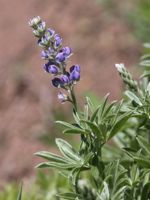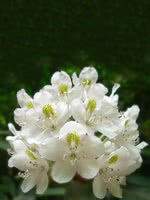Mon-Fri 9am - 5pm Mountain time
White Lights Rhododendron (Azalea) vs Silky Lupine
Lupinus sericeus
Rhododendron x White Lights
CUSTOM GROW
CUSTOM GROW
Silky Lupine is a native perennial wildflower known for its upright spikes of blue to violet flowers. Blooming from late spring into summer, the nectar-rich, showy blossoms attract a variety of pollinators, especially bees and butterflies. The plant’s fine, silky foliage provides soft texture and visual interest, enhancing landscapes throughout the growing season.
Silky Lupine is a nitrogen-fixing plant that enriches soils and supports surrounding vegetation. Its deep roots stabilize soil, and it spreads naturally by ejecting seeds from drying pods. If spread isn’t desired, new seedlings are easy to remove. While it is foraged by some wild animals, it contains alkaloids that are toxic to livestock. Silky Lupine is well-suited to pollinator gardens, naturalization plantings, erosion control, and ecological restoration projects.
White Lights Rhododendron is part of the Northern Lights Series, cold hardy, and deciduous. In late spring you'll be drawn to its fragrant white blooms. In fall, the foliage turns a beautiful purple-bronze color. Pruning is recommended after the flowers are spent to control the size and shape of this shrub.
White Lights Rhododendron should be your next hedge/screen, or plant it on its own as a specimen plant.
Silky Lupine Quick Facts
White Lights Rhododendron (Azalea) Quick Facts
Toxicity: toxic to sheep and other livestock
Toxicity: All parts of a rhododendron bush, including the leaves, stems and blooms, are toxic to cats, dogs, and horses.

